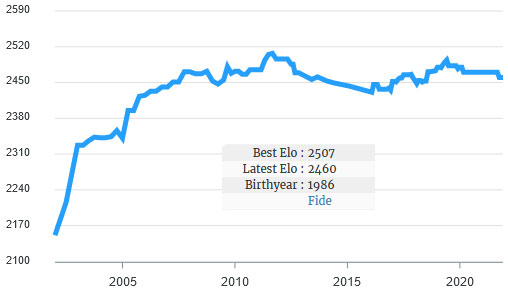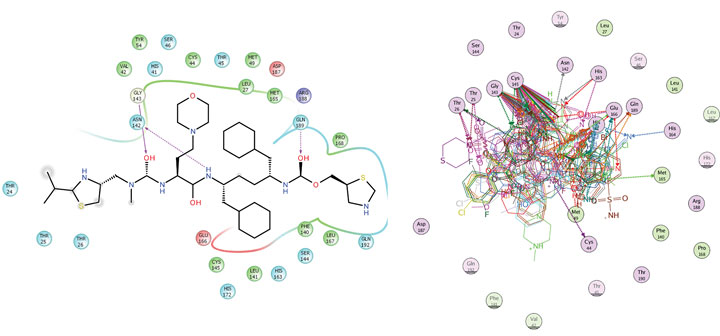by Frederic Friedel
3/14/2022 – Cobicistat is a drug that was originally devised for HIV/AIDS therapy. Now a new study shows that it can inhibit the replication of SARS-CoV-2 – which would mean we could have a powerful therapeutical drug against Covid-19. Very encouraging news – but why are we reporting this on a chess news page? Because one of the virologists working on the project happens to be a chess grandmaster. Here's his story. | Photos Lara Gallucci.
.jpeg)

Iart Luca Shytaj
He was born in Albania (Tirana) in 1986. His parents moved to Italy when he was six years old and he became an Italian citizen in 2007.
Luca (as he is known to friends) is a very strong player who won the Albanian Chess Championship in 2003 and represented Albania twice in Olympiads (Calvia 2004 and Turin 2006) and Italy once in an Olympiad (Dresden 2008 – the picture above, by Cathy Rogers, was taken there) and once in a European Team Championship (Novi Sad 2009).
He won the Albanian Championship (2003), the Italian Rapid Championship (2009), and the Italian Team Championship in 2016 playing for the Fischer Chieti team.

Luca was awarded the title in October 2018, the 14th Italian player to achieve the title of GM.
In the scientific field Luca holds a master degree in Genetics and Molecular Biology (from the “La Sapienza” University in Rome). He obtained a PhD in “Medical Microbiology, Immunology and Infectious Diseases,” working on an HIV cure project under the supervision of Andrea Savarino. Later he performed his research at the Italian Institute of Health in Rome and at Heidelberg University in Germany. He is currently a visiting Professor at the Federal University of Sao Paulo in Brazil.
When I showed Luca the click-bait title of my article, he asked me if I knew Betteridge's law, which states that "any headline that ends in a question mark can be answered by the word no". I definitely hope that this is not the case here. I have urged Luca to abandon his attempts to rearrange little pieces of wood on a checkered board slightly better than other people, and concentrate on the more urgent global tasks that need to be solved.
Cobicistat
Luca and his team have been working on Cobicistat, a drug used in HIV/AIDS therapy, showing that it could have an effect against COVID-19. That is the result of a study, until now conducted only in vitro and in an animal model, published in the journal of the American Society of Microbiology, mBio.
The international team of authors proved that Cobicistat inhibits the replication of SARS-CoV-2 with a different mechanism from those of the drugs currently used, i.e. by blocking the fusion of the virus to its target cells. Furthermore, the drug can attenuate the progression of the disease in a hamster animal model (Mesocricetus auratus), by enhancing the effect of another drug previously tested against COVID, i.e. Remdesivir.
If you are interested in the details of the research, the article on COVID is now published and free to read:

ASM Journals: The FDA-Approved Drug Cobicistat Synergizes with Remdesivir To Inhibit SARS-CoV-2 Replication In Vitro and Decreases Viral Titers and Disease Progression in Syrian Hamsters
He was born in Albania (Tirana) in 1986. His parents moved to Italy when he was six years old and he became an Italian citizen in 2007.
Luca (as he is known to friends) is a very strong player who won the Albanian Chess Championship in 2003 and represented Albania twice in Olympiads (Calvia 2004 and Turin 2006) and Italy once in an Olympiad (Dresden 2008 – the picture above, by Cathy Rogers, was taken there) and once in a European Team Championship (Novi Sad 2009).
He won the Albanian Championship (2003), the Italian Rapid Championship (2009), and the Italian Team Championship in 2016 playing for the Fischer Chieti team.

Luca was awarded the title in October 2018, the 14th Italian player to achieve the title of GM.
In the scientific field Luca holds a master degree in Genetics and Molecular Biology (from the “La Sapienza” University in Rome). He obtained a PhD in “Medical Microbiology, Immunology and Infectious Diseases,” working on an HIV cure project under the supervision of Andrea Savarino. Later he performed his research at the Italian Institute of Health in Rome and at Heidelberg University in Germany. He is currently a visiting Professor at the Federal University of Sao Paulo in Brazil.
When I showed Luca the click-bait title of my article, he asked me if I knew Betteridge's law, which states that "any headline that ends in a question mark can be answered by the word no". I definitely hope that this is not the case here. I have urged Luca to abandon his attempts to rearrange little pieces of wood on a checkered board slightly better than other people, and concentrate on the more urgent global tasks that need to be solved.
Cobicistat
Luca and his team have been working on Cobicistat, a drug used in HIV/AIDS therapy, showing that it could have an effect against COVID-19. That is the result of a study, until now conducted only in vitro and in an animal model, published in the journal of the American Society of Microbiology, mBio.
The international team of authors proved that Cobicistat inhibits the replication of SARS-CoV-2 with a different mechanism from those of the drugs currently used, i.e. by blocking the fusion of the virus to its target cells. Furthermore, the drug can attenuate the progression of the disease in a hamster animal model (Mesocricetus auratus), by enhancing the effect of another drug previously tested against COVID, i.e. Remdesivir.
If you are interested in the details of the research, the article on COVID is now published and free to read:

ASM Journals: The FDA-Approved Drug Cobicistat Synergizes with Remdesivir To Inhibit SARS-CoV-2 Replication In Vitro and Decreases Viral Titers and Disease Progression in Syrian Hamsters
Abstract
Combinations of direct-acting antivirals are needed to minimize drug resistance mutations and stably suppress replication of RNA viruses.
Currently, there are limited therapeutic options against the severe acute respiratory syndrome coronavirus 2 (SARS-CoV-2), and testing of a number of drug regimens has led to conflicting results.
Here, we show that cobicistat, which is an FDA-approved drug booster that blocks the activity of the drug-metabolizing proteins cytochrome P450-3As (CYP3As) and P-glycoprotein (P-gp), inhibits SARS-CoV-2 replication. Two independent cell-to-cell membrane fusion assays showed that the antiviral effect of cobicistat is exerted through inhibition of spike protein-mediated membrane fusion. In line with this, incubation with low-micromolar concentrations of cobicistat decreased viral replication in three different cell lines including cells of lung and gut origin.
When cobicistat was used in combination with remdesivir, a synergistic effect on the inhibition of viral replication was observed in cell lines and in a primary human colon organoid. This was consistent with the effects of cobicistat on two of its known targets, CYP3A4 and P-gp, the silencing of which boosted the in vitro antiviral activity of remdesivir in a cobicistat-like manner.
When administered in vivo to Syrian hamsters at a high dose, cobicistat decreased viral load and mitigated clinical progression. These data highlight cobicistat as a therapeutic candidate for treating SARS-CoV-2 infection and as a potential building block of combination therapies for COVID-19.
Editor-in-Chief emeritus of the ChessBase News page.
Studied Philosophy and Linguistics at the University of Hamburg and Oxford, graduating with a thesis on speech act theory and moral language. He started a university career but switched to science journalism, producing documentaries for German TV. In 1986 he co-founded ChessBase.

No comments:
Post a Comment